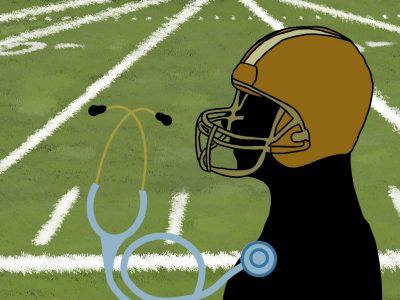Super Bowl LVII took over TVs everywhere Sunday, with viewers across America gathering together to watch acclaimed musician, Rihanna, perform this year’s landmark halftime show, and of course — the Kansas City Chiefs versus the Philadelphia Eagles.

What’s even more noteworthy than this year’s teams is the strides the National Football League is making in history with its two starting Black quarterbacks — Jalen Hurts and Patrick Mahomes.
In recent years, the NFL has taken its foot off the pedal of progress in tackling issues related to the lack of diversity in top department positions and the treatment of Black players. Many see tonight’s rank as a chance of redemption for the $132 billion organization— but does a lucky lineup really warrant that kind of commendable merit?
While history is technically being made tonight, this feat is nothing to be overly content about, especially when given the ratio of Black players to Black people in head or coaching positions.
According to a report conducted by the NFL in 2022, 70% of all its players were Black. Despite a high representation on the field, there is astonishing underrepresentation in the offices and on the sidelines. Prior to this season, the league only had three Black head coaches and no Black team owners.
This clear discrepancy continues to prove that the NFL has not completely rooted out all the racism within its management, and is hardly committed to diversifying its front offices.
Each year the NFL puts out some sort of phony statement declaring their promise to work on equity within the league, with the commissioner this year feeding the public the exact sentiments they want to hear: “diversity makes us stronger.”
But history tells us another story.
Indeed, the disproportion on the field is no accident, studies conducted by the NCAA show that Black students at a Division I university are 13 times more likely to be on a football or basketball scholarship compared to a white student.
Not only that, but the NFL specifies its marketing strategies to target young Black boys in underfunded communities, promising them that the heavy-hitting sport is a quintessential step in the pathway to success.
Still, the overarching issue isn’t solely grounded in what color viewers see more of on the field — the true conflict has more to do with the ways Black players are treated like disposable bodies.
Black athletes, when playing on a predominantly white team, are more likely to be recruited for more impact-heavy positions such as running back or wide receiver. In recent years, studies have been pouring out discussing the long-lasting impact of recurring head trauma, stemming from these roles, on athletes’ behavior and cognitive function.
A study done at Boston University concluded that just one season of tackle football for boys under the age of 12 could lead to an increased risk of cognitive and emotional defects. Researchers also noted that there was a dramatically increased likelihood that they would develop chronic traumatic encephalopathy — a fatal condition that causes memory loss, depression and dementia.
Yet, in a sport where head injuries are commonplace for all players, medical treatment is still not invested in equitably.
In 2021, the NFL faced a lawsuit pertaining to their use of “race norming” when it came to concussion testing. Under this norm, team doctors presumed Black players had a lower cognitive baseline score, making it harder for them to be formally diagnosed with a concussion or head injury.
Evidently, medical discrimination is a very real and pervasive dilemma for the organization, but this becomes severely intensified when you consider the statistics.
A study on the brains of former NFL football players found that out of the 111 tested, 110 of them had C.T.E. Though the condition may not be entirely preventable, early signs of head trauma found through these concussion tests can be essential in saving a player’s life.
If Black athletes continue to have their injuries dismissed and denied by team doctors — it calls to question how much the industry truly values the roles of its non-white players.
Now on the heels for Super Bowl Sunday, where the NFL broadcasted a record-breaking lineup to millions of viewers, it’s worth letting the facts speak for themselves before being blindsided by a prejudiced organization.
Black athletes deserve to be valued as human beings, not just bodies that can withstand some concentrated hits. If the league is truly committed to enforcing equality, then they must examine these abhorrent displays of discrimination that broadcast cameras can no longer hide.
This article was written by Co-Opinion Editor Analise Bruno





















































































































